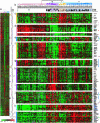Gene expression profiling identifies clinically relevant subtypes of prostate cancer
- PMID: 14711987
- PMCID: PMC321763
- DOI: 10.1073/pnas.0304146101
Gene expression profiling identifies clinically relevant subtypes of prostate cancer
Abstract
Prostate cancer, a leading cause of cancer death, displays a broad range of clinical behavior from relatively indolent to aggressive metastatic disease. To explore potential molecular variation underlying this clinical heterogeneity, we profiled gene expression in 62 primary prostate tumors, as well as 41 normal prostate specimens and nine lymph node metastases, using cDNA microarrays containing approximately 26,000 genes. Unsupervised hierarchical clustering readily distinguished tumors from normal samples, and further identified three subclasses of prostate tumors based on distinct patterns of gene expression. High-grade and advanced stage tumors, as well as tumors associated with recurrence, were disproportionately represented among two of the three subtypes, one of which also included most lymph node metastases. To further characterize the clinical relevance of tumor subtypes, we evaluated as surrogate markers two genes differentially expressed among tumor subgroups by using immunohistochemistry on tissue microarrays representing an independent set of 225 prostate tumors. Positive staining for MUC1, a gene highly expressed in the subgroups with "aggressive" clinicopathological features, was associated with an elevated risk of recurrence (P = 0.003), whereas strong staining for AZGP1, a gene highly expressed in the other subgroup, was associated with a decreased risk of recurrence (P = 0.0008). In multivariate analysis, MUC1 and AZGP1 staining were strong predictors of tumor recurrence independent of tumor grade, stage, and preoperative prostate-specific antigen levels. Our results suggest that prostate tumors can be usefully classified according to their gene expression patterns, and these tumor subtypes may provide a basis for improved prognostication and treatment stratification.
Figures



Similar articles
-
MUC1 is upregulated in advanced prostate cancer and is an independent prognostic factor.Prostate Cancer Prostatic Dis. 2016 Sep;19(3):242-7. doi: 10.1038/pcan.2016.11. Epub 2016 May 10. Prostate Cancer Prostatic Dis. 2016. PMID: 27165976
-
Genomic profiling reveals alternative genetic pathways of prostate tumorigenesis.Cancer Res. 2007 Sep 15;67(18):8504-10. doi: 10.1158/0008-5472.CAN-07-0673. Cancer Res. 2007. PMID: 17875689
-
Molecular Subgroup of Primary Prostate Cancer Presenting with Metastatic Biology.Eur Urol. 2017 Oct;72(4):509-518. doi: 10.1016/j.eururo.2017.03.027. Epub 2017 Apr 10. Eur Urol. 2017. PMID: 28408174
-
[Microarrays].Urologe A. 2004 Jun;43(6):653-8. doi: 10.1007/s00120-004-0578-6. Urologe A. 2004. PMID: 15138693 Review. German.
-
Genomic profiling defines subtypes of prostate cancer with the potential for therapeutic stratification.Clin Cancer Res. 2013 Aug 1;19(15):4058-66. doi: 10.1158/1078-0432.CCR-12-3606. Epub 2013 May 23. Clin Cancer Res. 2013. PMID: 23704282 Free PMC article. Review.
Cited by
-
An extension of PPLS-DA for classification and comparison to ordinary PLS-DA.PLoS One. 2013;8(2):e55267. doi: 10.1371/journal.pone.0055267. Epub 2013 Feb 11. PLoS One. 2013. PMID: 23408965 Free PMC article.
-
Pten loss and RAS/MAPK activation cooperate to promote EMT and metastasis initiated from prostate cancer stem/progenitor cells.Cancer Res. 2012 Apr 1;72(7):1878-89. doi: 10.1158/0008-5472.CAN-11-3132. Epub 2012 Feb 20. Cancer Res. 2012. PMID: 22350410 Free PMC article.
-
The 2016 John J. Abel Award Lecture: Targeting the Mechanical Microenvironment in Cancer.Mol Pharmacol. 2016 Dec;90(6):744-754. doi: 10.1124/mol.116.106765. Epub 2016 Oct 14. Mol Pharmacol. 2016. PMID: 27742780 Free PMC article. Review.
-
A Neural Network Framework for Predicting the Tissue-of-Origin of 15 Common Cancer Types Based on RNA-Seq Data.Front Bioeng Biotechnol. 2020 Aug 5;8:737. doi: 10.3389/fbioe.2020.00737. eCollection 2020. Front Bioeng Biotechnol. 2020. PMID: 32850691 Free PMC article.
-
Unmasking the immune recognition of prostate cancer with CTLA4 blockade.Nat Rev Cancer. 2012 Mar 1;12(4):289-97. doi: 10.1038/nrc3223. Nat Rev Cancer. 2012. PMID: 22378189 Free PMC article. Review.
References
-
- Parkin, D. M., Bray, F. I. & Devesa, S. S. (2001) Eur. J. Cancer 37, S4–S66. - PubMed
-
- Hsing, A. W., Tsao, L. & Devesa, S. S. (2000) Int. J. Cancer 85, 60–67. - PubMed
-
- Jemal, A., Murray, T., Samuels, A., Ghafoor, A., Ward, E. & Thun, M. J. (2003) CA Cancer J. Clin. 53, 5–26. - PubMed
-
- Farkas, A., Schneider, D., Perrotti, M., Cummings, K. B. & Ward, W. S. (1998) Urology 52, 444–448; discussion, 448–449. - PubMed
-
- Han, M., Partin, A. W., Piantadosi, S., Epstein, J. I. & Walsh, P. C. (2001) J. Urolol. 166, 416–419. - PubMed
Publication types
MeSH terms
Substances
Grants and funding
LinkOut - more resources
Full Text Sources
Other Literature Sources
Medical
Molecular Biology Databases
Research Materials
Miscellaneous

